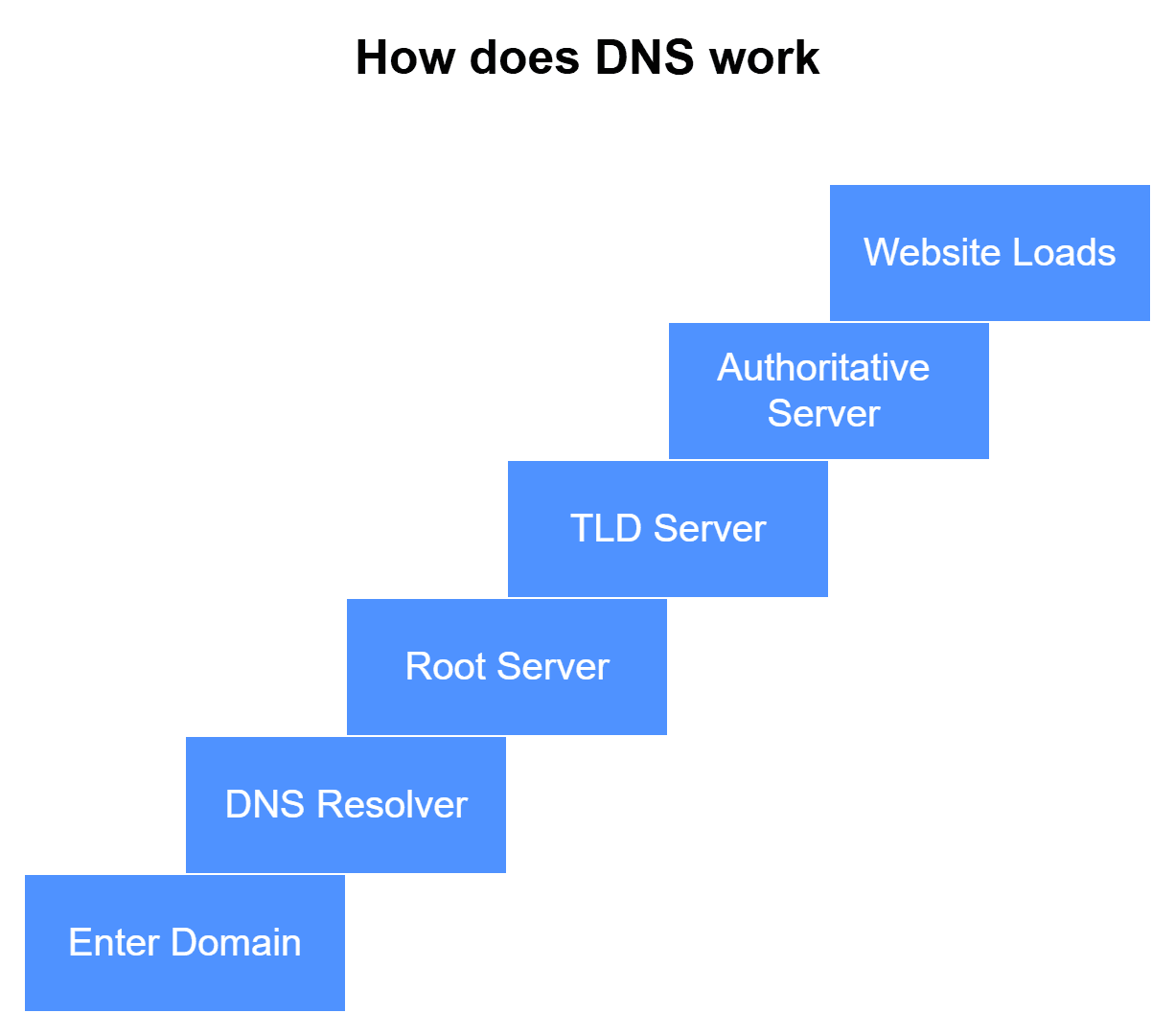What is a Domain Name System?
The Domain Name System translates human-readable domain names like example.com into numerical IP addresses used by computers to locate servers. DNS acts as the internet's address book, guiding browsers to the correct web server when users enter a website address. It plays a critical role in website accessibility and performance.
How does DNS work?
Let’s break it down step by step:

- You enter a domain name: Let’s say you type in www.wearetenet.com in your browser.
- Request hits a DNS resolver: This is like your internet service provider’s (ISP) first checkpoint. It asks, “Hey, what’s the IP address for this name?”
- Root server connection: If the resolver doesn’t know the IP, it consults a root server, acting like a giant map pointing to the correct "road" (i.e., location servers to check next).
- Top-Level Domain server: The root server leads us to the TLD server for .com domains, narrowing the search. This server knows where Tenet’s website lives.
- Authoritative name server: Finally, we hit Tenet’s authoritative DNS. This server says, “Here’s the IP address; now go fetch the webpage.”
- Website loads on your browser: The IP address is retrieved, and voilà—your Tenet website pops up.
Put simply, DNS is the behind-the-scenes magic of your URL bar.
It's the bridge that connects user-friendly web addresses to the technical workings of servers and infrastructure.
Why is DNS important in UI/UX design or marketing success?
Imagine launching a new website where every pixel, color, and interaction oozes perfection—but your DNS setup falters.
Suddenly, users face laggy load times, errors, or simply can't reach your website. It’s like having a gorgeous retail storefront but locking the doors. Proper DNS configuration ensures users get a seamless online experience.
Here are direct reasons why DNS is crucial for your websites:
- Faster website speeds: A low-latency DNS lookup can reduce page delays—speed and efficiency are components of any growth strategy. Slow pages can negatively impact user experience and, consequently, bounce rates.
- Domain trust alignment: Your audience, whether startups or seasoned SMEs, needs to feel secure. Verifying your brand domain (e.g., SSL certificates complementary to DNS settings) builds instant trust during visits. Imagine marketing a product or generating $1.54 billion in opportunities, only to lose clicks due to a "site not secure" tag.
- Global scalability: Tenet operates across 15+ countries—countries with unique infrastructure, demands, and audiences. Without a scalable DNS service (like a Content Delivery Network or CDN enhanced by DNS), international users might experience delays finding your page, which can harm Google search rankings and turn users to competitors.
Common pain points related to DNS
If you’re responsible for managing your business’s UI/UX design development or leading a marketing team at a startup, here are some common DNS-related issues you’ll want addressed:
1. Long or misconfigured domain settings
Solution: Perform a full design audit or CRO audit, ensuring DNS is optimized to respond fast in all geographical markets.
2. Slow DNS queries impacting conversion rates
Solution: Tie DNS setup into broader growth marketing strategies. For instance, leveraging DNS caching reduces lookup delays, which directly improves a customer’s experience while interacting with your carefully designed landing pages.
3. Outages or DNS hijacking hazards
Solution: Employ DNS-based security extensions to protect investments and customer data—a must when you’re aiming for 20M+ global consumer impacts or working with eCommerce SaaS solutions.
Types of DNS records every business should know
When talking about UI/UX design, web optimizations, or even building a marketing funnel strategy, understanding the primary DNS records can make your operations more robust. Here are some key DNS records and their significance:
- A Record: Links a domain directly to its IP address; for example, wearetenet.com’s homepage.
- CNAME Record: Aliases one domain to another. Think of a subdomain like blog.wearetenet.com pointing back to the main domain’s IP for fluid navigation.
- MX Record: Dictates how emails flow to your mail server, critical for campaigns like email marketing.
- TXT Records: Commonly used for verification processes like linking Tenet’s digital portfolio to tools like Google Analytics or third-party content hubs.
How does DNS affect SEO (Search Engine Optimization)?
DNS may seem like a background player in the digital marketing space, especially compared to forefront strategies like PPC advertising or content marketing, but poor DNS can sabotage an entire SEO strategy. Here’s how:
- DNS speed affects rankings: If your DNS provider is slow, Google notices, and slower-performing pages could lose their position in searches.
- Downtime due to missing configurations: Websites with frequent DNS failures take a hit in both user trust and rankings.
- Dealing with human error: Misconfigurations happen while scaling large marketing projects. Especially during cross-platform app development or while switching platforms during branding resets/research, dynamic DNS support minimizes errors.
Ready to scale DNS-friendly strategies for breakthrough results?
If your business needs expertise in digital growth, from custom CMS development to conversion rate optimization, Tenet can help. With a proven record of 98% client satisfaction, our teams are uniquely suited to identify technical bottlenecks like DNS inefficiencies and align them with your broader goals.
